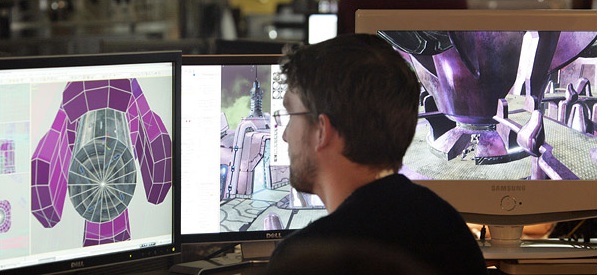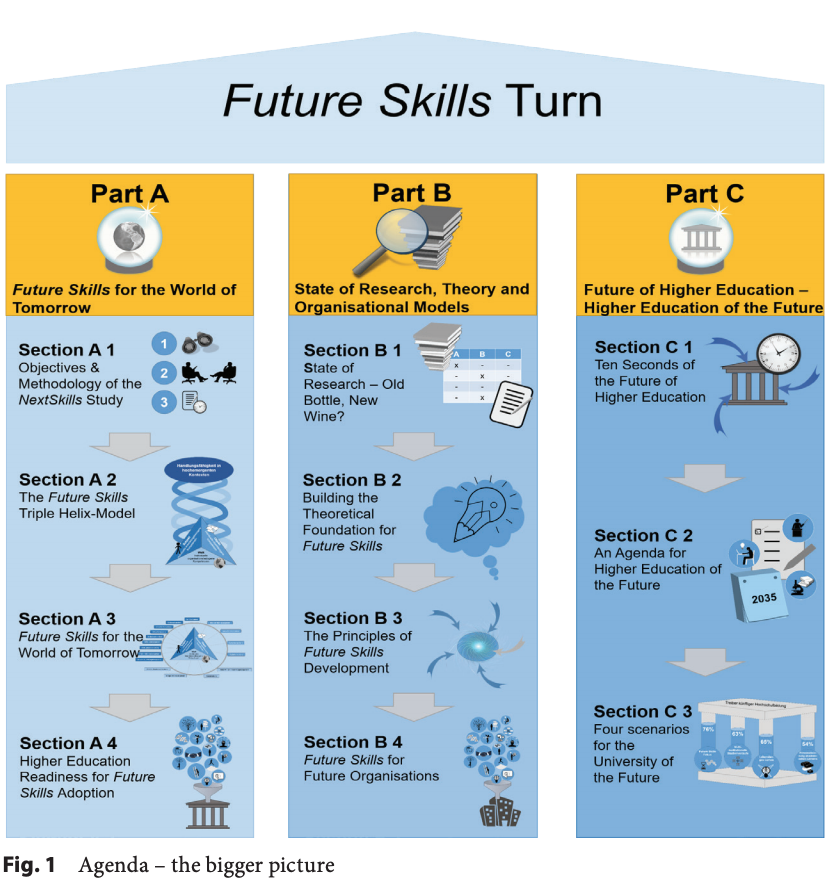
Ehlers, U-D. (2020) Future Skills: the future of learning and higher education Karlsruhe, Germany: Herstellung und Verlag, pp. 311
What is this book about?
This free, open book has a very ambitious agenda:
It asks the question how the university as an institution can master the future and the question as to what the future of higher education looks like….The complete integration of a deep competence orientation in the sense of the ability to deal with highly emergent systems, emergent organisations and unknown situations of the future, has so far been introduced only to a limited extent. The emerging discussion about Future Skills deals with the question of how this emerging can be done.
The results show that to deal with future challenges, students must develop curiosity, imagination, vision, resilience and self-confidence, as well as the ability to act in a self-organised way. They must be able to understand and respect the ideas, perspectives and values of others, and they must be able to deal with mistakes and regressions, while at the same time progressing with care, even against difficulties.
It became clear to us that the question of how young people can be empowered to participate in social systems and processes, and how we can strengthen justice, peace and the integrity of creation and community as values in a future society, will determine the relevance of our higher education institutions in the future.
Higher education institutions would do well to turn away from the goal of imparting knowledge that is primarily concerned with self-contained and easily verifiable relations for which there are right and wrong answers. In the future it will be important to study the basis of questions for which there are no immediate correct answers, but in which it is a matter of weighing, plausibly arguing and representing value attitudes and orientations. The NextSkills project was launched to find out what these skills are and how they can best be developed.
The challenge
Individuals will have to deal with situations in the future that can neither be predicted nor calculated in advance… The question is clear: how to deal with the unforeseen? Contributions to Future Skills must provide answers to this question. [But] our current university education concepts are still strongly oriented towards knowledge transfer. Building up and accumulating knowledge in order to then call it up in future professional action contexts is – to put it pointedly – the current game of higher education, studies and the labour market. However, it seems that we have reached the limits of this way of working.
Our study shows that especially in those fields of work that can be regarded both as highly agile and at the same time knowledge-intensive, simple retrievable knowledge is less and less the currency of future labour market success, but Future Skills are.
Structure of the book
The focus is on three questions:
- What skills will people need in the future to shape their world and environment as citizens in an increasing globalised context? What skills do employees need in order to cope with the constant development and constant adaptation to new situations in organisations and working life? We call these skills Future Skills.
- How can organisations help their staff to acquire these skills and what organisational forms and structures are needed to develop the optimal organisational cultures for this?
- What can higher education institutions do to promote these skills among students? How should studies and teaching be structured, and which forms of higher education didactics and learning designs are suitable?

Main book conclusions
Everything that is easy to teach and easy to assess is also easy to digitise – and thus also to automate. Future Skills such as creativity, self-organisation-abilities, self- and reflection competence or Design Thinking Competence, however, require ingenious forms of learning, teaching and development. It is therefore a question of how the promotion of Future Skills can be anchored in higher education curricula. This involves concentrating on active, creative forms of teaching and learning and educational objectives that require complex assessment scenarios, and that go beyond the mere transfer of knowledge and focuses on the development of specific competences.
My comments
It’s hard to do justice to this book in a single blog post. This is a really important book for all who teach, and especially for senior managers, in universities and colleges. The book makes a very strong case for a radical change in the way we educate students. It puts heavy emphasis on networked and collaborative learning and also on lifelong learning. It takes a more sophisticated approach to identifying the necessary skills than just a list of competences (although there are indeed plenty listed in the book).
The book has a strong empirical basis, drawing on practice in both the business and educational worlds and provides guidelines and strategies for facilitating and developing future skills. It demonstrates that future skills are much broader than digital literacy.
Ehlers does not have much to say about the role of online learning in skills development (it starts to go down the rabbit hole of meta-analysis and quasi-experimental comparisons of conventional vs digital learning, but jumps out quickly when it discovers what a mess this is) but he does recognise the value of open educational resources. Frankly, Ehlers is looking at a higher level of change than mere technological innovation in higher education. Nevertheless, as I point out in Teaching in a Digital Age, online – or rather digital – learning has a very important role to play in facilitating the development of future skills, but I also agree that it needs to be combined with radical changes in pedagogical approaches and institutional structures.
In short, the book is a well-researched, thoughtful and also practical analysis of the changes needed in our higher education systems if we are to develop the knowledge and skills our students will need in the future. Highly recommended.









 Dr. Tony Bates is the author of eleven books in the field of online learning and distance education. He has provided consulting services specializing in training in the planning and management of online learning and distance education, working with over 40 organizations in 25 countries. Tony is a Research Associate with Contact North | Contact Nord, Ontario’s Distance Education & Training Network.
Dr. Tony Bates is the author of eleven books in the field of online learning and distance education. He has provided consulting services specializing in training in the planning and management of online learning and distance education, working with over 40 organizations in 25 countries. Tony is a Research Associate with Contact North | Contact Nord, Ontario’s Distance Education & Training Network.

